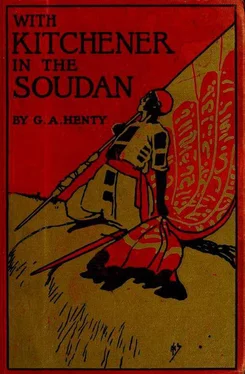Each day Gregory returned home so stiff and tired that he could scarcely crawl along. Still, he felt that he had made a good deal of progress, and that when he got up to Dongola he would be able to mount and ride out without exciting derision. On the morning of the day on which he was to start he went to say good-bye to Mr. Murray.
"Have you everything ready, Billiard?" the banker asked.
" Yes, sir; the uniform and the tent are both ready. I have a cork bed, and waterproof sheet to lay under it, and, I think, everything that I can possibly require. I am to meet Captain Ewart at the railway this afternoon at five o'clock; the train starts at half-past. I will draw another twenty-five pounds, sir. I have not spent more than half what I had, but I must leave some money with our old servant. I shall have to buy a horse, too, when I get up to Dongola, and I may have other expenses that I cannot foresee."
" I think that is a wise plan," the banker said. " It is always well to have money with you, for no one can say what may happen. Your horse may get shot or founder, and you may have to buy another. Well, I wish you every luck, lad, and a safe return."
"Thank you very much, Mr. Murray! All this good fortune has come to me entirely through your kindness; I cannot say how grateful I feel to you."
CHAPTER V
SOUTHWARD
T the hour named, Gregory met Captain Ewart at the station. He was now dressed in uniform, and carried a revolver in his waist-belt, and a sword in its case. His luggage was not extensive. He had one large bundle; it contained a roll-up cork bed in a waterproof casing. At one end was a loose bag which contained a spare suit of clothes, three flannel shirts, and his underclothing; this formed the pillow. A blanket and a waterproof sheet were rolled up with it. In a small sack was the tente d'abri made of waterproof sheeting, with its two little poles. It only weighed some fifteen pounds. His only other luggage consisted of a large case with six bottles of brandy, and the provisions he had been recommended to take.
"Is that all your kit?" Captain Ewart said as he joined him.
" Yes, sir; I hope you don't think it is too much."
"No; I think it is very moderate, though if you move forward you will not be able to take the case with you. The others are light enough, and you can always get a native boy to carry them. Of course you have your pass?"
"Yes, sir; I received it yesterday when I went to headquarters for the letter to General Hunter."
" Then we may as well take our places at once. We have nearly an hour before the train starts, but it is worth waiting in order to get two seats next the window on the river side. We need not sit there till the train starts, if we put our traps in to keep our places. I know four or five other officers coming up, so we will spread our things about and keep the whole carriage to ourselves if we can."
In an hour the train started. Every place was occupied. Ewart had spoken to his friends as they arrived, and they
had all taken places in the same compartment. The journey lasted forty hours, and Gregory admitted that the description Captain Ewart had given him of the dust was by no means exaggerated. He had brought, as had been suggested, a water-skin and a porous earthenware bottle, together with a roll of cotton-wool to serve as a stopper to the latter to keep out the dust. In a tightly-fitting hand-bag he had an ample supply of food for three days. Along the opening of this he had pasted a strip of paper.
"That will do very well for your first meal, Hilliard, but it will be of no good afterwards."
"I have prepared for that," Gregory said. "I have bought a gum bottle, and as I have a newspaper in my pocket I can seal it up after each meal."
"By Jove, that is a good idea, one I never thought of!"
" The gum will be quite sufficient for us all up to Assouan. I have two more bottles in my box. That should be sufficient to last me for a long time when I am in the desert; and as it won't take half a minute to put a fresh paper on after each meal, I shall have the satisfaction of eating my food without its being mixed with the dust."
There was a general chorus of approval, and all declared that they would search every shop in Assouan and endeavour to find gum.
"Paste will do as well," Ewart said, "and as we can always get flour we shall be able to defy the dust fiend as far as our food goes. I certainly did not expect that old campaigners would learn a lesson from you, Hilliard, as soon as you started."
" It was just an idea that occurred to me," Gregory said.
The gum bottle was handed round, and although nothing could be done for those who had brought their provisions in hampers, three of them who had, like Gregory, put their food in bags were able to seal them up tightly.
It was now May, and the heat was becoming intolerable, especially as the windows were closed to keep out the dust,
In spite of this, however, it found its way in. It settled everywhere: clothes and hair became white with it; it worked its way down the neck, where the perspiration changed it into mud. It covered the face as if with a cake of flour. At first Gregory attempted to brush it off his clothes as it settled upon them, but he soon found that there was no advantage in this. So he sat quietly in his corner, and, like the rest, looked like a dirty white statue. There were occasional stops, when they all got out, shook themselves, and took a few mouthfuls of fresh air. Gregory's plan for keeping out the dust from the food turned out a great success, and the meals were eaten in the open air during the stoppages. On arriving at Assouan they all went to the transport department to get their passes for the journey up the Nile as far as Wady Haifa.
The next step was to go down to the river for a swim, and by dint of shaking and beating to get rid of the accumulated dust. Assouan was not a pleasant place to linger in, and as soon as they had completed their purchases Captain Ewart and Gregory climbed on to the loaded railway train and were carried by the short line to the spot where, above the cataract, the steamer that was to carry them was lying. She was to tow up a large barge and two native craft. They took their places in the steamer with a number of other officers—some new-comers from England, other men who had been down to Cairo to recruit. They belonged to all branches of the service, and included half a dozen of the medical staff, three of the transport corps, gunners, engineers, cavalry, and infantry. The barges were deep in the water with their cargoes of stores of all kinds, and rails and sleepers for the railway, and the steamer was also deeply loaded.
The passage was a delightful one to Gregory. Everything was new to him. The cheery talk and jokes of the officers, the graver discussion of the work before them, the calculations as to time and distance, the stories told of what had taken place during the previous campaign by those who shared in it —were all so different from anything he had ever before experienced that the hours passed almost unnoticed. It was glorious to think that, in whatever humble capacity, he was yet one of the band who were on their way up to meet the hordes of the Khalifa, to rescue the Soudan from the tyranny under which it had groaned, to avenge Gordon and Hicks and the gallant men who had died with them! Occasionally Captain Ewart came up and talked to him, but he was well content to sit on one of the bales and listen to the conversation without joining in it. In another couple of years he too would have had his experiences, and would be able to take his part. At present he preferred to be a listener.
The distance to Wady Haifa was some three hundred miles ; but the current was strong, and the steamer could not tow the boats more than five miles an hour against it. It was sixty hours from the start before they arrived. Gregory was astonished at the stir and life in the place. Great numbers of native labourers were at work unloading barges and native craft, and a line of railway ran down to the wharves, where the work of loading the trucks went on briskly. Smoke pouring out from many chimneys, and the clang of hammers, told that the railway engineering work was in full swing. Vast piles of boxes, cases, and bales were accumulated on the wharf, and showed that there would be no loss of time in pushing forward supplies to Abu Hamed as soon as the railway was completed to that point. Wady Haifa had been the starting-point of a railway commenced years before. A few miles has been constructed and several buildings erected for the functionaries, military and civil; but Gordon, when Governor of the Soudan, had refused to allow the province to be saddled with the expenses of the construction or to undertake the responsibility of carrying it out.
Читать дальше












